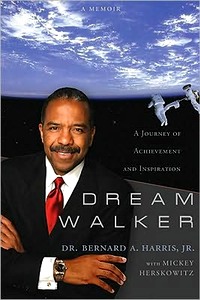Review: Dream Walkerby Jeff Foust
|
| One of the ironies of Dream Walker is that while Harris goes into great detail talking about the efforts he took to realize his childhood dream of becoming an astronaut, there’s far less about his career as an astronaut. |
Harris, whose major claim to fame as an astronaut is being the first African-American to perform a spacewalk, on a 1995 shuttle flight, writes that he was inspired to become an astronaut when he watched the Apollo 11 landing on television. At the time the 13-year-old Harris was living in New Mexico, where his mother was teaching on an Indian reservation, part of a childhood that saw him move from Texas to Arizona and New Mexico before returning to Texas. While he decided to become an astronaut, he kept that goal a secret from most people even as he pursued a medical degree, trained as a doctor, and even took a research fellowship at NASA Ames; his reasoning was that he did not want anyone to discourage him from that goal. His mother, he writes, had no idea of his goal until FBI investigators showed up to interview her when he first applied to join the astronaut corps.
Harris didn’t get selected the first time he applied (one of the few setbacks he encountered on his journey to his goal) but did get a job at the Johnson Space Center, which helped him build up his experience and credentials so that he made it the second time he applied, in 1990. That led to a relatively brief career as an astronaut: two shuttle flights, including that spacewalk on his second flight, before deciding to leave NASA for work in the private sector and initiatives to improve science and math education.
One of the ironies of Dream Walker is that while Harris goes into great detail talking about the efforts he took to realize his childhood dream of becoming an astronaut, there’s far less about his career as an astronaut. What’s provided are primarily a handful of anecdotes from his training and the two missions, such as the experience of being on Columbia for his first mission when its launch was aborted after main engine ignition. But there’s surprisingly little detail about the two missions, or the training leading up to them. Other than the opening chapter, where Harris recalls his experience on his spacewalk (including getting painfully cold at one point during a test of temperature sensors in his suit), he spends less then 30 pages from the time he’s selected to be an astronaut to when, shortly after his second mission, he decides to leave NASA, having satisfied those childhood dreams.
The second half of Dream Walker is about Harris’s post-NASA career, with his forays into the business world and his outreach work trying to get students interested in math and science. Late in the book he veers into self-help territory, with a chapter that discusses his religious beliefs and even offers tips and exercises to help tap “the power within” to help the reader achieve his or her own dreams, as Harris has. He notes that he is “anguished” about including this chapter in a book about his life, but that he believes it’s essential to discuss it: “A book about me and my achievements would not capture the full essence of who I am without this discussion.” It’s clear that Dream Walker is a book less interested in unearthing minutiae about an astronaut’s life than using those experiences as a tool for motivating others.
